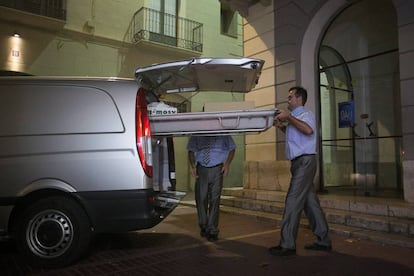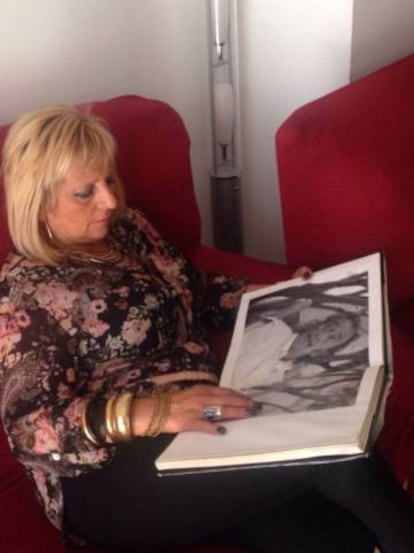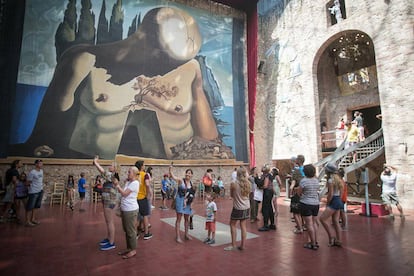Body of Spanish painter Salvador Dalí exhumed over paternity suit row
Hair, nails and bone samples taken during controversial exhumation carried out on Thursday night

“Salvador Dalí is resting once again.” Officials at the Gala-Salvador Dalí Foundation made this announcement on Friday morning, just hours after the Surrealist artist’s remains were exhumed and samples taken from his nails, hair and two bones as part of a paternity claim brought by a woman who says she is his daughter.

The managers of the artist’s estate had been fighting the exhumation tooth and nail, saying that Dalí’s remains should be left alone. Ever since his death in 1989, the controversial artist has been lying inside a crypt under the stage of the Dalí Theater-Museum in the Catalan town of Figueres.
Foundation officials called the move “totally uncalled for” and said the court order was unsubstantiated. Critics of the decision have also cast doubt on the validity of the kinship claim made by Pilar Abel, a woman who works as a fortune-teller for a living and who previously brought an unsuccessful suit against Spanish writer Javier Cercas for allegedly using her as the basis for one of his characters.

Enrique Blánquez, Abel’s lawyer, said that the results of the DNA test might be ready in two weeks. The official forecast is for August or early September. The trial date for the paternity claim is set for September 18.
Albert Segura, the foundation’s legal representative, said that if Abel is found to be Dalí’s daughter she would be entitled to 25% of his estate at the time of death. The loser would be the Spanish state, which the childless Dalí designated as his sole heir.
Dalí’s mummified body was taken out of its resting place between 8pm and midnight on Thursday, and samples extracted between that time and 1am. The remains were in a good state of conservation, said Figueres Mayor Marta Felip, one of the few people who were allowed into the crypt during a process shrouded in secrecy.
“The mustache still preserved its classic ‘ten minutes after ten’ angle. Seeing that was a very exciting moment,” admitted Lluís Peñuelas, the secretary general of the Gala-Salvador Dalí Foundation.
For the first hour and a half, infrastructure was put in place to lift the 1.5-ton slab that was sealing the grave shut. After that, operators took out the wooden, zinc-covered coffin containing the mummified remains of the creator of iconic 20th-century art objects such as the lobster-telephone and the Mae West Lips sofa.
The exhumation had been preceded by a flurry of activity at the popular Dalí Theater-Museum, which the artist built during his lifetime to his own greater glory.
Shortly before 8pm, a group of around 300 local residents, reporters and police officers milled around the entrance. Onlookers were clearly divided into twmusto camps: those who strongly believe that Abel is Dalí’s daughter, and those who do not.
Carmen Moreno had skipped her daily knitting club meeting to be here. Holding the sweater she is making for her daughter, she asserted that Abel “cannot be Dalí’s daughter because it was always said that he was impotent.” Her husband, standing next to her, added that Abel is doing it for the money.

But Marisol García had a different opinion: “I have known her for years and I would like for her to be right. Her lawyer deserves it: a court-appointed counsel fighting against so many powers, and getting so far already.” García, who is retired, used to work at a clothing store named Tamarís, which both Gala and Dalí were customers of. “I think Pilar looks like Dalí.”
But there is yet another theory out there: Lluís Duran, owner of the Hotel Duran and Café Astoria, is convinced that the paternity claim is a ploy by the Spanish government to take the Dalí museum to Madrid. “The political situation is very difficult right now, I wouldn’t be surprised if they wanted to take is, as a form of revenge.”
In any event, Mayor Marta Felip was clear on one thing: that Thursday was the second most important day in the history of Figueres – after the day that Dalí was buried. After all, the confrontation and media attention all fits in with the artist’s own life, which was devoted to provocation and show business.
English version by Susana Urra.
Tu suscripción se está usando en otro dispositivo
¿Quieres añadir otro usuario a tu suscripción?
Si continúas leyendo en este dispositivo, no se podrá leer en el otro.
FlechaTu suscripción se está usando en otro dispositivo y solo puedes acceder a EL PAÍS desde un dispositivo a la vez.
Si quieres compartir tu cuenta, cambia tu suscripción a la modalidad Premium, así podrás añadir otro usuario. Cada uno accederá con su propia cuenta de email, lo que os permitirá personalizar vuestra experiencia en EL PAÍS.
¿Tienes una suscripción de empresa? Accede aquí para contratar más cuentas.
En el caso de no saber quién está usando tu cuenta, te recomendamos cambiar tu contraseña aquí.
Si decides continuar compartiendo tu cuenta, este mensaje se mostrará en tu dispositivo y en el de la otra persona que está usando tu cuenta de forma indefinida, afectando a tu experiencia de lectura. Puedes consultar aquí los términos y condiciones de la suscripción digital.








































